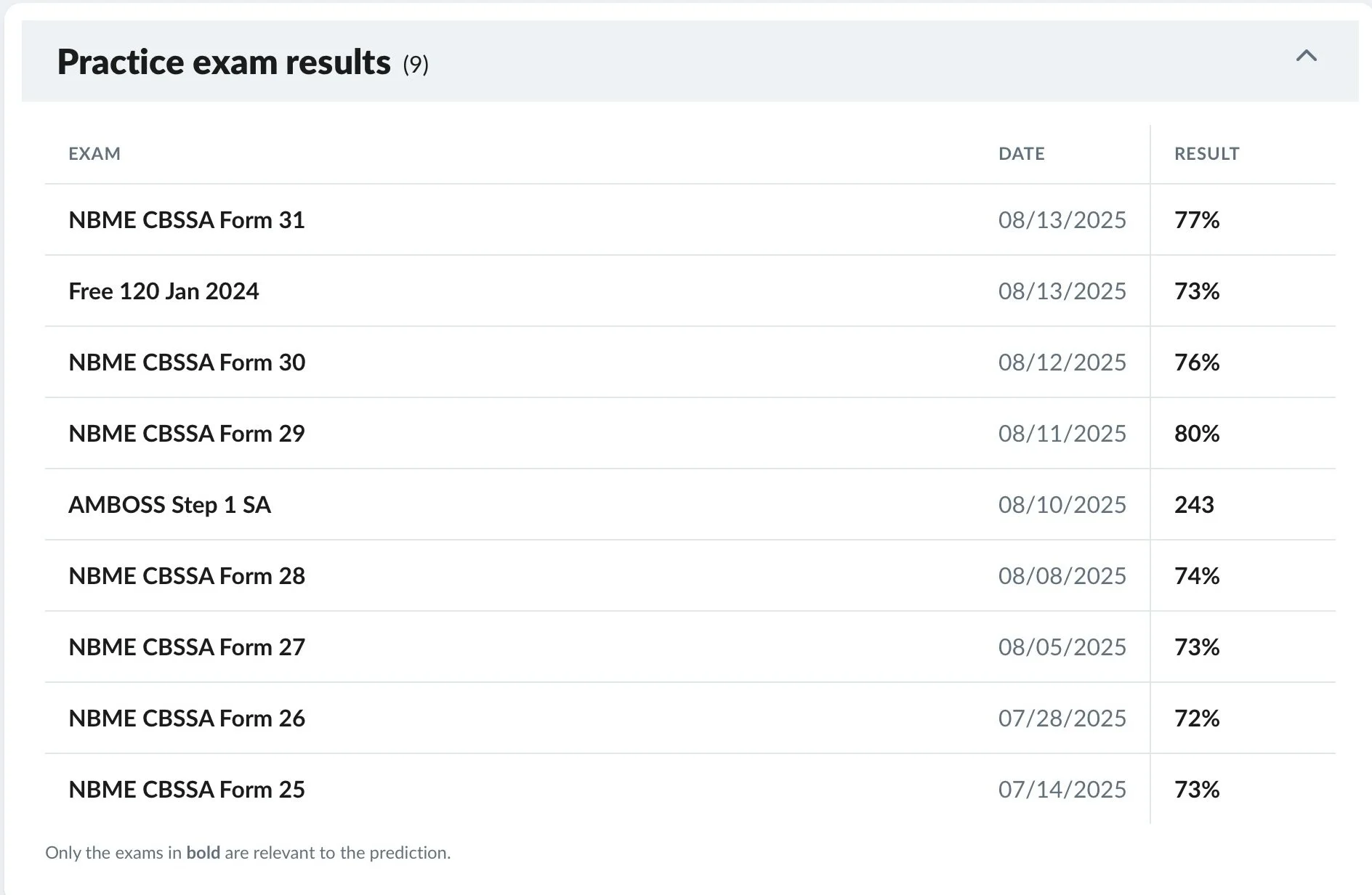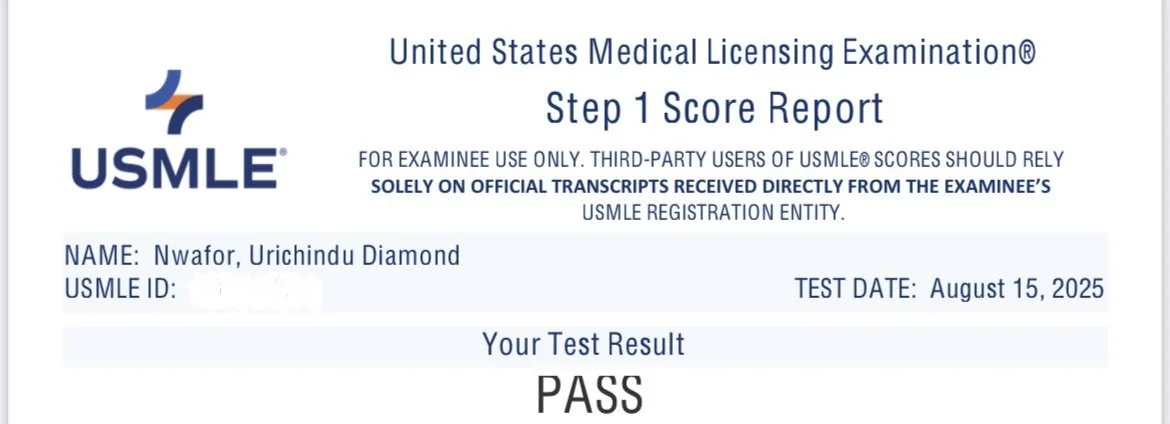USMLE Step 1: My Journey From Prep to Pass
I started studying for Step 1 sometime in January 2025. I had already decided I wanted to take the exam during the summer, either July or August, and eventually booked the exam for August 15.
At the start, I mainly used Boards and Beyond and Sketchy (for microbiology and pharmacology). I watched Boards and Beyond videos while annotating in First Aid, then reviewed the corresponding Anki cards. I also used the AMBOSS Qbank in tutor mode, system by system, depending on what I was studying at the time. Since I had several months to prepare, I leaned heavily on Anki, knowing that long-term retention would be my biggest challenge.
Now, let me just say: at this time, I was still in the thick of my regular med school life. I had exams, I had hospital rotations, basically school wasn’t giving me a break. Trying to balance Step 1 with my actual schoolwork felt impossible some days. The only way I survived was by syncing them. I studied whatever system we were doing in school for Step 1 too. Honestly, that strategy worked wonders because it made me learn topics more deeply for both school and Step.
By the time school ended on June 20, I had maybe 50-60% of Step 1 content done. And to be real, I was scared. I hadn’t even opened UWorld yet, and I kept asking myself how I was going to finish everything. But I was stubborn about not moving my exam. I wanted to close this chapter and still have at least two weeks of peace before school started again.
Dedicated
Dedicated was… brutal. I told myself I’d finish all Step 1 content, do NBMEs 25–31, and cover at least 50–60% of UWorld in less than two months. Ambitious? Yes. But I was determined.
My schedule was 10–12 hour days, every day. I cried more than once (okay, maybe more than once a week). I was mentally and physically drained most of the time. Sometimes I’d try to take a day off, but then I’d feel guilty, so breaks were rare.
In the beginning, I was still using Anki and Boards and Beyond, but by week two of dedicated, I just couldn’t anymore. I know I’m obsessed with Anki, it has helped me tremendously, and I proudly call myself the “queen of Anki” . But during dedicated, it just didn’t feel as beneficial. With such a short period of time to prepare, I knew I was less likely to forget new information quickly, and I didn’t want to waste precious hours reviewing cards I already knew. On top of that, I was burnt out and frustrated. So I limited Anki to questions I kept getting wrong, aiming for about 50 reviews a day. As time went on, I stopped using it altogether and created a filtered deck of only my incorrects, which I planned to review on the day before my exam.
That’s also when I switched to Pathoma instead of Boards and Beyond, and honestly, that switch saved my life. It made me enjoy studying again. I paired it with Physeo for physiology and Dirty Medicine for biochemistry and ethics and Randy Neil’s Youtube channel for Biostatistics .
It was in this time that I decided to stick with AMBOSS as my QBank. I had planned to start UWorld in July, but when I saw the price ($319 for one month), I nearly fainted. I’d already spent so much money on this exam, and since my school gave me AMBOSS for free, I had to make a decision.
Before committing, I went on Reddit to see if anyone had passed Step 1 using only AMBOSS. I found a few people who shared their success stories, and I decided to take their word for it and trust the process. And honestly? I have zero regrets.
AMBOSS was enough. Between the QBank and the library, I felt fully prepared. If you’re wondering whether AMBOSS alone can get you through Step 1, the answer is a loud yes. And it’s cheaper too!
NBMEs
By mid-July, I was about 70–80% through Step 1 content and started taking NBMEs. I did all of them offline, but I was strict: timed blocks, no peeking at answers, full test-day simulation. My trick for time management was to finish every 50-question block in 1 hour instead of 1 hour 15 minutes. That forced me to practice being quick. This honestly helped me tremendously in the exam day because my time management during the real deal exam was solid.
Here are my NBME scores :
I also did AMBOSS Self Assessment. 3 days to my exam, I attempted to do NBME 30 and 31 back-to-back to simulate the real deal. Let me tell you—it was brutal. After 5 blocks I was done, mentally cooked. I split the rest over the next day. And honestly? That’s fine. On the real day adrenaline will carry you, and 8 hours actually flies.
Then came Free 120, two days before my exam. Oh boy. This was the test that showed me just how much anxiety can wreck performance. Normally, I’m calm during practice exams, but the second I saw that USMLE-style interface (since I never used UWorld), I panicked. My brain froze. I couldn’t focus. I rushed through the first block in pure anxiety and ended up with a 52%, the lowest score I had ever seen during prep.
Cue crying. Again.
But I regrouped, took a break, and came back calmer. When I redid that same block, I scored 72%, proving that the first attempt was pure nerves. I then went on to complete the remaining two blocks that same day and finished strong, ending with an overall 73% on the Free 120.
Lesson learned: anxiety can trick you into believing you don’t know anything, when in reality, you know much more than you think.
The Day Before
The day before my exam, I skimmed Pathoma chapters 1–5, reviewed a few Anki cards from my AMBOSS incorrects filtered deck, and shut my books by 5 p.m. I ate, packed my exam snacks, showered, and tried to sleep.
Spoiler alert: I didn’t.
I tossed and turned until 3 a.m., panicked that I was ruining everything. I even cried (are you sensing a theme here? I cry a lot 😂). Eventually, I went on Reddit to see if anyone else had gone through the same thing, and sure enough, lots of people said they didn’t sleep at all before Step and still did fine. That gave me some peace. I may have gotten one hour of sleep, maybe less, but I told myself: months of hard work won’t be erased by one bad night.
Exam Day
I got to my Prometric center at 7:30 a.m., went through the security process, and suddenly boom the exam started. I actually laughed in my head like, “Wow, this is real. Okay, let’s do it.”
And honestly? It felt like an NBME with free 120 question style and length. Sure, there were some tough questions where I was stuck between two answers, or I forgot some random tiny fact, but overall, I felt confident. I marked about 10–16 questions per block and always had 10–15 minutes at the end to review them.
At one point, I went to the bathroom, looked in the mirror, and literally said to myself: “Wow, I’m having such a wonderful exam today.” And it was true. I genuinely felt like it was going well. That confidence carried me through the rest of the test.
Here’s how I split my breaks:
Block 1: 5 minutes
Block 2: 15 minutes (snack + restroom)
Block 3: 2 minutes (took ibuprofen for a headache)
Block 4: 15 minutes (snack + restroom)
Block 5: 5 minutes
Block 6: 15 minutes (snack + restroom)
Block 7: finished 🎉
The crazy thing is that I never felt tired. Adrenaline carried me the whole way. Don’t be scared of long questions on the exam, in fact, I found the long questions easier because they gave more context. It was the short ones that tripped me up.
When I walked out, I felt relief. I was almost certain I passed, and I was just so glad it was over.
Results
Twelve days later, my score report came in: I passed 🎉
Fun fact: I had actually ruined the surprise for both myself and you guys. I had planned to record a reaction video, but the night before, I gave in to curiosity after seeing a Reddit post about how to check your result early on FSMB. It was a Tuesday around 11 p.m., and since most people said results take about three weeks, I wasn’t even expecting mine yet and it hadn’t even been two weeks. But I followed the steps, and to my shock, the word “Pass” popped up on the screen. I couldn’t believe it and even had to Google if it was reliable. Spoiler: it was. So when my official score report came out the next day, the big reaction moment was already gone, but at least now I have this story to tell instead.
This exam had been hanging over my head since the second year of medical school. Four years later, I finally did it. It wasn’t easy, and it’s not supposed to be, but it was absolutely worth it.
If you’re in your preclinical years, the best way to prepare for Step 1 is to build a strong foundation in the basic sciences. Really understand your basics. That solid understanding will carry you through the exam, because when the time comes, your brain doesn’t need to learn everything from scratch, it just needs a refresher.
Here’s the most important part: trust yourself and trust your preparation. There will be moments when it feels like you’re forgetting everything, like you’re failing at every question, like you’re just “not smart enough.” But you are. All those hours of studying, reviewing, and practicing are inside you, even if it doesn’t feel like it. When you sit for the exam, your brain knows what’s at stake. It rises to the challenge. The knowledge you’ve built, the strategies you’ve practiced, and the consistency you’ve maintained will all come together. You will perform at your optimum capacity, even if it feels overwhelming at first.
Step 1 taught me that success isn’t about perfection. It’s about persistence, consistency, and believing in yourself. It’s about showing up every day, putting in the work, and trusting that your effort will pay off. One hard block doesn’t define you. One tough day doesn’t erase months of progress.
If you’re in the middle of prep and doubting yourself, remember this: you are capable of more than you think. You’ve got this. Keep going. Trust yourself. Trust your process. When exam day comes, walk in with confidence, knowing that all your preparation has built the skills and knowledge you need to succeed.
Resources I Used
Paid resources can be found for free here

